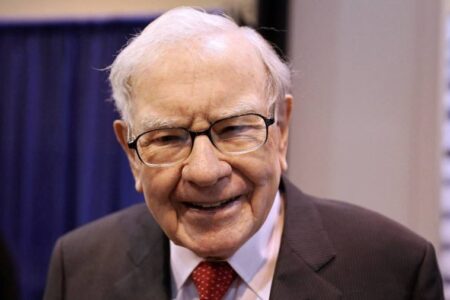Warren Buffett says there could have been “catastrophic” consequences if US regulators had not insured deposits at Silicon Valley Bank and Signature Bank, as their failures could send a wave of lenders across the country.
“Even though the FDIC (Federal Deposit Insurance Corporation) limit is $250,000 . . . . the Berkshire Hathaway CEO told tens of thousands of shareholders gathered in downtown Omaha for the company’s annual meeting on Saturday.
The comments come on the heels of a string of bank failures in the US that have sparked a heated debate about the intervention of the federal government, which has protected deposits at both SVB and Signature Bank above the $250,000 level covered by federal insurance.
Regulators were able to get around this limit by classifying both of them as systemic risks. While regional bank stocks have swung wildly in recent trading sessions, depositors have been calmed somewhat by the tacit guarantee that the government will intervene in the crisis.
I can’t imagine anyone in the administration, Congress, or the Federal Reserve. . . Saying that I would love to be the one to go on TV tomorrow and explain to the American public why we only have $250,000 insured,” Buffett added. “It will start running down every bank.”
Berkshire has been pressed about the state of the banking system, with Buffett saying CNBC last month That the country has not finished with “bank failures, but depositors have not experienced a crisis.”
The sprawling group from industries to insurance had previously used its balance sheet, which Buffett likened to a fortress, to invest in ailing financial institutions. Berkshire invested in both Goldman Sachs and Bank of America during the financial crisis.
However, it has not yet intervened during the current crisis. Investors note that Berkshire’s portfolio already has positions in a number of large financial institutions.
Advisers to First Republic, which this month was sold to JPMorgan Chase in a deal orchestrated by US regulators, told the Financial Times that Berkshire’s investment in the bank was seen as an unlikely solution.
This was due to the rapid filing journey that First Republic was experiencing. Advisers believe the bank will burn billions of dollars in capital injections if Berkshire’s investment is not enough to boost confidence.
Buffett spent Saturday morning answering shareholder questions that touched on real estate planning, value investing, US-China relations and, most important of all, to those gathered at the CHI Health Center in downtown Omaha, the Berkshires’ succession.
The 92-year-old investor confirmed that Greg Appel, the company’s vice president charged with managing all of its businesses outside of insurance, remained his designated successor.
He added, “Everyone talks about the executive bench, and it’s bunk.” “We don’t have that many people who can run five of the largest GAAP net worth companies and all sorts of diversified businesses.”
Abel has been with the company for more than two decades, when Berkshire acquired MidAmerican Energy in 2000. In 2018, he was elevated to vice president alongside Ajit Jain.
There’s only one reason Berkshire has outperformed other large conglomerates, added Charlie Munger, Buffett’s longtime right-hand man and vice president of the company.
“We change managers less frequently than others do and that has helped,” he said.
